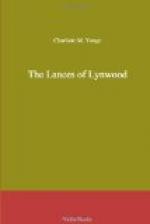“Well, my brave young Sir,” said he, advancing, “how is it with you this morning? You look cheerily; I trust we shall soon have you on horseback again.”
“Thanks to the blessed Saints and to you, Sir John,” replied Eustace. “I fear you fared ill last night for,”—and he looked round with a smile—“you see, I occupy the state bed-chamber.”
“The better, Sir Eustace,” said Chandos. “It does my heart good to see such a chamber as this—none of the tapestry and hangings which our young Knights nowadays fence themselves with, as if they kept out the foe—this is what it is meant for—a stronghold, and not a bower. I’ll have my dainty young Master Neville up here, to see how a good Knight should be lodged.”
“I fear he would scarce consider it as an example,” said Eustace, smiling, “since all our simplicity would not have availed to protect us, but for your coming. We little dreamt to see this morning’s light.”
“True, but where should I look for a garrison to make such a defence as you and your Squire have done? When I saw the spot, and looked at the numbers, and heard how long you had held out, methought I was returned once more to the good old days of Calais. And here this youth of mine, not yet with his spurs, though I dare say full five years older than you, must needs look sour upon it, because he has to sleep on a settle for one night—and that, too, when he has let Oliver de Clisson slip through his fingers, without so much as a scratch taken or given on either side! It grieves my very soul to think on it! But all has gone to rack and ruin since the Prince has been unable to set the example.”
“Is the Prince better in health?”
“Yes—so they say—but his looks tell another tale, and I never expect to see him on horseback again,” said the old warrior, with a deep sigh. “But I have to do his bidding here, and have much to ask of you, Sir Eustace; and I do it the more willingly, that I rejoice to see a brave man righted.”
“Has the Prince, then, commanded an inquiry into my conduct?” exclaimed Eustace, joyfully. “It is what I have ever most warmly desired.”
“And know you whom you have to thank?” said Sire John. “That youngster who stands at your feet—’twas he that, with little Prince Edward, burst into the council, and let not another word be said till he had told your need, given Fulk Clarenham the lie direct, and challenged him to prove his words. Pray when is the defiance to be fought out, Sir Page?”
Arthur coloured crimson, and looked down; then raising his glowing face, said firmly, “To-morrow, if need were, Sir—for God would defend the right!”
“Roundly spoken, Master Page! But let not your early years be all talk, nothing worth.”
“The same warning that you gave to me, Sir John,” said Eustace.
“When you thought I looked coldly and churlishly on your new-won honours,” said Sir John. “I own I thought the Prince was bestowing knighthood over lightly—and so do I say still, Sir Eustace. But I saw, afterwards, that you were not so easily uplifted as I had thought. I saw you as diligent in the study of all that was knightly as if your spurs were yet to earn, and I knew the Prince had a brave young servant in you.”




